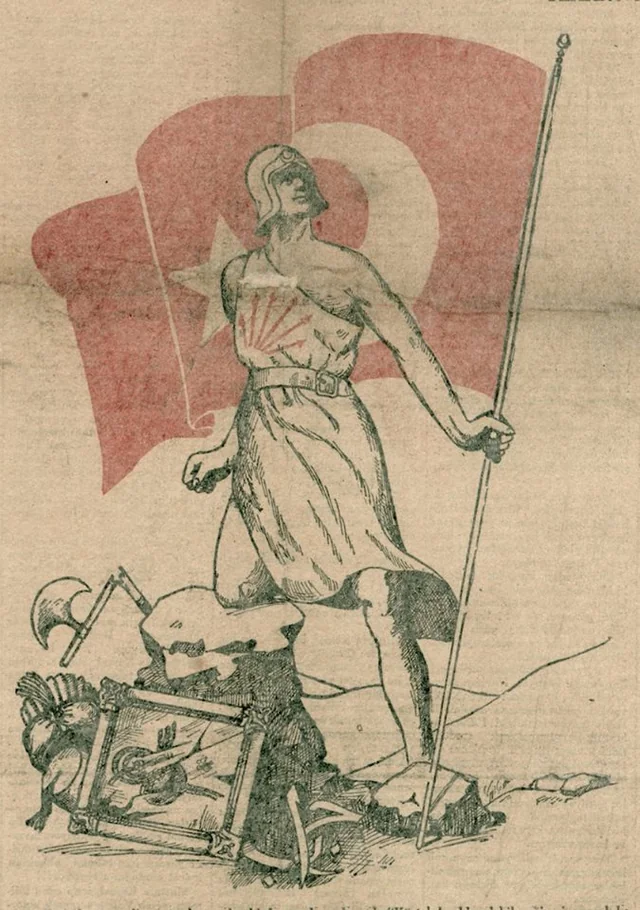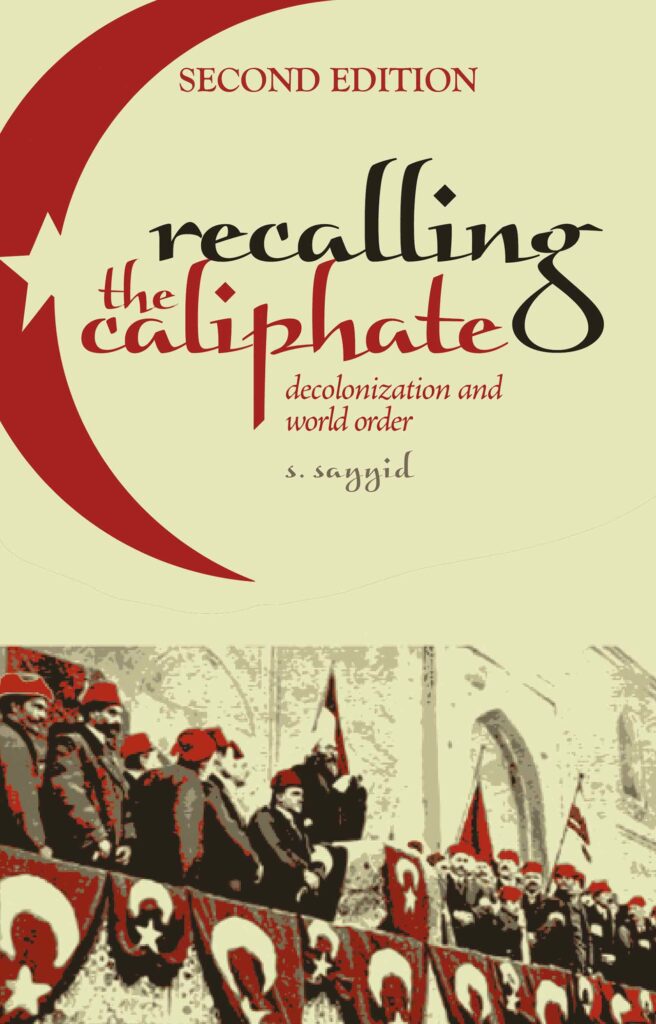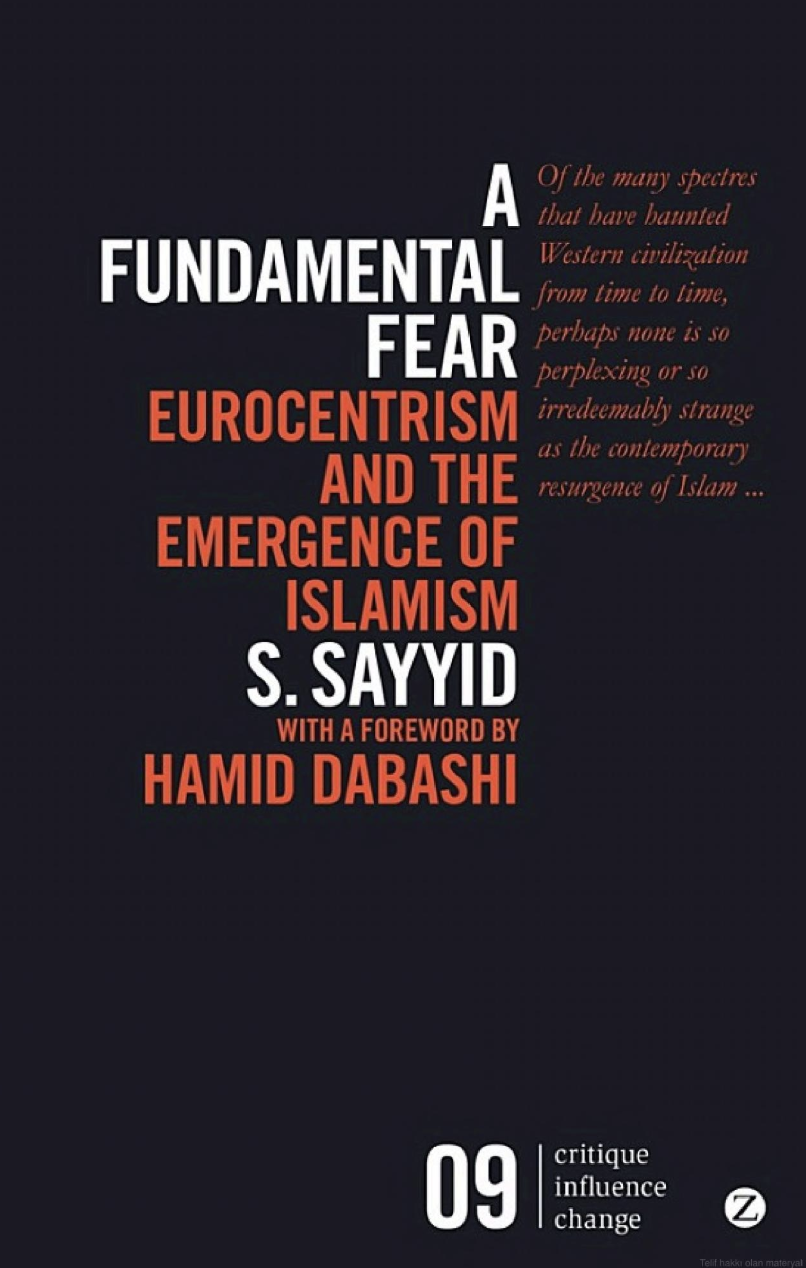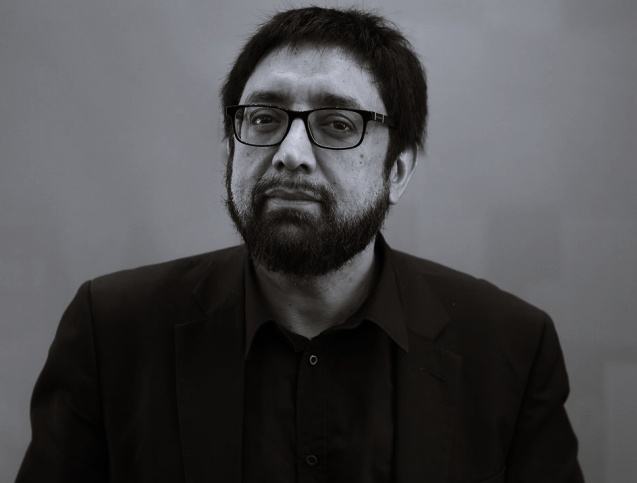S. Sayyid is one of the foremost Muslim intellectuals of our time. His books Recalling the Caliphate and A Fundamental Fear have sparked major debates in both the Muslim world and the West. Despite his busy schedule, Sayyid made time to speak with us about Islamism, Gaza, conservative revolutionism, and many other issues.
Today, both Muslim communities and Western structures tend to declare Islamism as either obsolete or dangerously anachronistic. Yet ‘Islamism’ is a plural, multi-layered intellectual and political tradition. What should we understand by Islamism in today’s world? Does the term still carry a future-oriented vision, or has it merely become a nostalgic relic?

The demise of Islamism has been predicted with great regularity and frequency, almost from the very moment it began to be identified as a phenomenon. The failure of these predictions is not astrological but epistemological. It stems from the way in which understandings of histories and societies beyond the West are saturated by varieties of Orientalism.
So, I agree with the premise of your question: Islamism is indeed a plural complex, multi-layered intellectual-moral-political orientation. However, it exists against the backdrop of Orientalism. Orientalism is not only an academic affliction; it is also deeply embedded in policymaking circles and among opinion-shaping elites across the world. As such, it forms the background against which all expressions of Muslimness are interpreted, especially those that appear to articulate political agency. Within the scope of Orientalism, Muslimness that does not mirror the telos of Western historical development is rendered a dangerous and ultimately futile anachronism.
Orientalism not only provides kindling for the fire of Islamophobia in Islamicate settings but also mutates into a broader Kemalism that seeks to reconstruct Islamicate societies and communities in which Muslimness is reduced to an epiphenomenal detail, playing no significant role in the future being shaped by technocrats schooled in Orientalism, whether in Western or local institutions. The logic of Kemalism can be found throughout societies and communities marked by a significant presence of Muslimness.
Islamists have often struggled to resist the Kemalist temptation. This is partly because Kemalism aligns so neatly with the colonial-racial rule experienced by most countries of Muslimistan. . It is also because the colonial-racial logic did not end with the dismantling of formal European colonial empires but was embedded in the sinews of the postcolonial order. Moreover, the labour required to challenge the continuities of the colonial-racial orientation, manifested in the form of Kemalism, has largely fallen to individuals with Islamist instincts, rather than being grounded in a coherent Islamist theory.

For example, there is little by way of a developed Islamist theory of Islamophobia, the state, or political economy. Recent well-intentioned efforts toward the Islamisation of knowledge have done little, to borrow the title of Ngũgĩ wa Thiong’o’s book, to decolonise the mind. Instead, they often merely transcribe “Westernese” into what Orientalism frames as Islamicate-friendly idioms, and describe this as decolonisation. Without a map and compass, which theory can provide, there is a tendency to drift back to the default settings produced by Orientalism.
The challenge contemporary Islamism faces is how to develop the collective will to combat Islamophobia in Islamicate settings, where it frequently takes the form of Kemalism and is sustained by a culture infused with Gharbzadegi, and reinforced by the planetary Islamophobia war-machine. This war-machine interdicts expressions of Muslimness through measures ranging from countering violent extremism programmes to extraordinary rendition, to the torture complex, and even genocide. As we know from several reputable sources, the War on Terror has led to the deaths of over five million Muslims and created wastelands, either directly through military interventions and crippling sanctions or indirectly through the imposition of (and clandestine support for) predatory kleptocratic tyrannies on Muslim populations.
As a consequence, any Islamist intervention remains precarious, often based on instincts of key individuals in specific conjunctures, who bear the responsibility and vulnerability of channelling the demands of often inchoate, determined but loosely articulated collective will. Islamism has found it is difficult to develop the tools needed to master statecraft and culturecraft that is productive rather than punitive. There has been a failure to develop a cadre capable of strengthening collective will centred on Islam, presenting itself as a vehicle for a better future, which dispels the hold of Orientalism and combats Islamophobia in all its forms: geopolitical, socioeconomic and conceptual.
The gap between the rulers and ruled so cruelly exposed by the inaction of Muslim leaderships in the face of ethnic cleansing of Kashmiris, Uyghurs, Rohingyas and genocide in Palestine, has to be closed. Failure to protect Muslims in one part of the world threatens Muslimness in all parts of the world.
How does Islamism respond to the major crises facing humanity today—moral collapse, ecological devastation, and epistemic monopolization? Does it offer a distinctive alternative beyond the frameworks of secular-left or liberal politics?

One of the challenges we all face is “identifying the major crisis facing humanity.” Some of these crises are perennial, for example, when was there a time when some sections of humanity or another did not complain about “moral collapse”? Others arise from shifts in policies and paradigms pursued by powerful institutions, while still others stem from long-term trends that appear beyond the horizon of most policymakers’ focus.
For Islamism to respond meaningfully to major crises, there must first be clarity about what those crises are and what causes them. Both tasks require sustained intellectual and cultural labour. Unfortunately, in the rush to once again declare the end of Islamism, or to promote the chimaera of post-Islamism, it is easy to overlook aspects of Islamism that have posed serious challenges to the right, the secular left, and liberal politics (whatever liberal means in the shadow of the genocide in Gaza). The forgetting arises from the way in which the conventional grid of political intelligibility bequeathed by the French Revolution is inadequate to map out Islamicate political positions and histories. The Left–Right distinction that emerged in revolutionary France, as I have argued elsewhere, has been rendered untenable by the Islamic Revolution in Iran when applied to the political logics of Muslimness. For example, Muslims are acutely aware of the irony in seeing some of their fellow citizens who are globally celebrated as liberals and leftists welcome military coups and endorse brutal tyrannies, so long as those regimes suppress popular movements suspected of being influenced by Islam.
Thus, there is an opportunity for Islamism not so much to develop policies (which is always going to be a situational task, besides the software of policies needs the hardware of an organisational infrastructure capable of implementing policies) but at least principles by which respond to the threat of climate, erosion of public service in favour of rule by billionaires, collapse of international rules based order, the rise of a turbo-charged ethno-nationalism…. Increasingly, we hear influential voices across the world asserting that these problems (to the extent some of these voices recognise them as problems) can only be solved by creating homogeneous ethnostates and abandoning any conception of justice or compassion, or empathy beyond the tribe. This of course, is no solution at all. It is these conceptions of the solution that Islamism can contest.
The current global trend of ethno-nationalism manifests in diverse forms, shaped by specific histories and regional contexts—for example, white revanchism, Hindutva, Han chauvinism, ultra-Zionism, and various expressions of Kemalism. Despite their differences, these forms of ethno-nationalism are united by a common thread: Islamophobia. Ethno-nationalist discourses are constituted with Muslimness as their antagonist, because Muslimness cannot be easily contained within the boundaries of the nation-state.
As Khomeini once said, Islam has no borders. Such sentiments are often dismissed, either as contradicted by the failure of Muslims to act collectively (i.e Ummatically), as a covert desire for expansion, or simply as empty words. However, despite many challenges, there are numerous instances where Islamist political logics have shown greater hospitality to refugees than Kemalism, giving in the process a concrete demonstration of their willingness to go beyond ethnonationalism. Recent examples include the AK Party in Turkey, which, despite considerable opposition (including from within its own base), continued to permit and support the presence of Syrian refugees. Similarly, Imran Khan, before his ouster, made efforts to extend citizenship rights to Afghan refugees in Pakistan.
Islamism, at its best, broadens the examples of emancipatory justice through which most Muslims, most of the time, understand the venture of Islam. To achieve this, Islamism involves cultivating a form of Muslimness that is not bound except Ummatically.
The logic of Islamism continues to be opposed by Kemalist tendencies. For example, the current rulers of Riyadh are promoting a pre-Islamic past of in attempt to link the legacy of the Nabateans to the Saudi regime, as a way of displacing Islam from national historiography. (A similar gesture was made by the former Shah of Iran, Mohammad Reza Pahlavi, who celebrated 2,500 years of ‘continuous’ monarchy on the eve of the Islamic Revolution.) Likewise, in Kazakhstan, the state has considered or implemented restrictions on religious dress, including the hijab, particularly in schools and government institutions. One can see how such policies converge with Islamophobia of France, Austria, China, Burma, or India, where there is a racist subjugation of how Muslimness is expressed.
All these examples and many others illustrate how ethnonationalism and Islamophobia often go hand in hand. They also highlight why it is crucial for Islamism to contest ethnonationalism, not only within broader society but also within its own ranks. This contestation must involve more than just expressing solidarity with the victims of ethnonationalism, whether they are Muslims or non-Muslims in India, China, France, Austria, the United States, or under Kemalist regimes in Muslimistan. It must also involve articulating a global vision for societies grounded in shared principles, offering a sense of purpose and the possibility of a more just future.
An Islamism that defines itself through the cultivation of a Muslimness that resists ethnonationalism, rejects genocide, and promotes justice and dignity for all is essential in the current conjuncture.
After World War II, the European conservative revolutionary tradition emerged with a critique of modernity, especially in relation to technology and secularism. In your view, can today’s Islamic movements take up a similar role—both in terms of political action and intellectual legacy—as a form of “conservative revolution”?

I would put it slightly differently. I believe there is a pressing need for contemporary Islamists to reflect on how to effect change so that Islamicate societies become exemplars of emancipatory justice. Looking at the state of the Ummah, this seems like a tall order. However, is that not the challenge of Islam?
Reflecting on how to accomplish effective change requires a robust critique of Eurocentrism and Orientalism, coupled with practical efforts to combat Islamophobia and Westoxification. These steps are necessary to clear the path for social transformation, allowing for the emergence of empowered, confident, and open-hearted communities committed to justice.
None of these things is, however, possible without a strategy for social transformation, and such a strategy is not possible without a theory of social change. I am not aware of a meaningful Islamist theory of social change that can guide the strategies for successfully building a collective will for its transformational project.
While there is undoubtedly a need for Islamists today to develop political and intellectual resources for reform and transformation, I am not convinced that the framework of the so-called “conservative revolution” is a useful or appropriate model for them. One of the most significant challenges Islamists face is a deeply Islamophobic international order that systematically suppresses autonomous expressions of Muslimness. The number of global spaces where Islamophobia is not gaining ground, where policymakers and opinion-shapers do not operate from the racist assumptions of a naturalised Orientalism, is rapidly shrinking.
So, I am sceptical about analogising Islamism to the European “conservative revolution.” A crucial distinction lies in Islamism’s explicit critique of Eurocentrism. By contrast, the conservative revolutionary tradition in Europe was often animated by a white revanchist reaction to the gains of anti-colonial and anti-racist struggles, and their resistance to the creation of a genuinely multicultural, post-imperial world.
Additionally, the conservative revolution was ultimately aligned with, and benefited from, the international order; Islamism, on the other hand, as we see in cases ranging from Somalia and Tunisia to Egypt, Pakistan… has been persistently interdicted, even when only tangentially associated with Islamist positions.
The events in Gaza have produced a significant rupture in global moral consciousness. How might this shape the discourse and public resonance of Islamism going forward? Can Islamism reconstruct a space of coherence and resistance in the face of such humanitarian crises?
I do not think genocide in Gaza is just a humanitarian crisis that may arise because of some natural disaster like a tsunami or volcanic eruption. The genocide in Gaza is not just “bad luck”; it is something that has been carried out by occupation forces, who are following the orders of their leadership, not some rogue actors. It is a genocide that has been aided and abetted by the United States and its proxies in the European Union, the Middle East, and beyond. They have supplied arms and excuses to ensure that the systemic killing of Palestinian men, women and children continues. The major Western plutocracies (with a few honourable exceptions), who proclaimed themselves to be the custodians of the international liberal order have been complicit (with a few honourable exceptions), with the genocide re-equipped the occupation forces, provided intelligence, diplomatic cover, acquiesced in threats against individuals and institutions trying to uphold international agreements, threatened and arrested opponents of genocide in many cases, undermining their own domestic laws and breaking the social contract with their citizens. This is not a humanitarian crisis, but an attempt to restore a colonial-racial order. From Guantanamo to Gaza, we have seen the undermining of civil and human rights during a time when liberalism was triumphant. So this is not just a humanitarian crisis.
The genocide in Gaza has sharpened the growing antagonism between rulers and the ruled worldwide. In Muslim communities, this gap is particularly noticeable. It is not a surprise that governments in Muslimistan, who have some sense of being accountable to their people, have tended to be far more demonstrative in their opposition to the genocide. Where Muslims are ruled by absolutists, whether wearing uniforms, suits or crowns, their ability or imagination to protest in favour of Palestine is severely curtailed; they are not even able or willing to object to a café bearing the name of the architect of the genocide in Gaza. In other places, where Muslim communities are able, they spontaneously responded by trying to boycott goods and services peddled by those they consider to be purveyors of genocide.
This is not merely a humanitarian crisis; it is a crisis of world-making. The world, as it is currently constituted, no longer makes sense. Gaza has revealed gaslighting on a global scale. These are not new lessons; they were already known by those who resisted colonial-racial rule. As Fanon observed, the West never stops talking about the rights of man, yet everywhere it goes, it kills men. The formal ending of colonial-racial empires, fooled many people into thinking that re-colonisation was unthinkable.
But this is exactly what we are witnessing in the deployment of global Islamophobia. There is a convergence of interests, ideas, and policies that support its spread, evident in how policies initiated by a colonial-settler regime in one context are transplanted into others through training, equipment, and ideological justification.
Yet those who should be consistently and fearlessly opposing Islamophobia remain divided or unaware. They tend to see Islamophobia episodically, not systematically, if they see it at all. The failure of many Islamists to analyse Islamophobia beyond rhetorical excess, beyond the belief that Muslims cause Islamophobia by their actions, limits their ability to grasp the full depth and scope of the challenges facing Muslimness today.
In the current post-Western conjuncture, Muslimness has become a container for the possibility of planetary plurality. If Islamists can recognise that the struggle for justice in Palestine has brought together a coalition of the willing—if they can reorient the post-Western moment toward a future beyond ethnonationalist enclosure of the commons, they can play a crucial role in the project of new world-making.
Across Europe and other regions, Muslim diasporas are developing a heightened sense of political awareness. Do you see this as holding the potential for a “new Islamism,” or is it destined to be assimilated into the limits of existing systems?
I do not believe that the Muslim diaspora is destined to be assimilated, if by assimilation we mean simply being absorbed into existing national narratives. In fact, the struggle in places like France, Austria, the United Kingdom, the United States, and elsewhere is not about assimilating but expelling Muslimness. How these struggles unfold is uncertain and will depend on how people of good faith, Muslims and non-Muslims alike, respond to these struggles. These campaigns may begin by targeting Muslims, but they increasingly erode the power of all people to hold their rulers accountable. What is at issue, then, is not destiny but strategy. After all, our destiny is known only to God. Strategy, however, is something we should know.
Alas, the strategic literacy of the Muslim diaspora is not significantly different from that found in Muslim-majority countries. The diaspora is also caught between takfirism and sectarianism on the one hand, and a deferential posture toward technocratic liberalism on the other. We should not underestimate how Islamophobia, through police harassment and media hounding, has dramatically narrowed the space for autonomous Muslim voices. This has made it more difficult to reflect seriously on the political potential of Islamism. Rather than thinking strategically about political possibilities, there is a growing tendency to retreat into a bricolage of self-help literature, fads ranging from AI to the manosphere, historical illiteracy, and comforting platitudes.
Nonetheless, as I argue in Recalling the Caliphate, the Muslim diaspora experiences Muslimness in a far more heterogeneous way, and expressions of Muslimness are often more Ummatic in nature.
In the diasporic settings of the global North, Muslims vote in significant numbers, contrary to Islamophobic expectations, and often for parties of the so-called Left. These are the same parties that are commonly associated with advancing “woke” policies, which are frequently portrayed as antithetical to Muslim values. This voting pattern indicates that the Muslim diaspora is politically engaged.
A defining feature of being political is the capacity to transcend one’s narrow conception of interest and to struggle for the greater good. To an extent, what is critical to politics is the overcoming of ego (this, of course, is not the case for many professional politicians, for whom politics is often a means of massaging their egos). To be politically aware is to possess empathy and engagement with the potential for a shared collective good. The Muslim diaspora in Western plutocracies has been at the forefront of the resistance to ethnonationalist erasure of postcolonial Convivencia.
Part of the Islamist project should involve a break with a reliance on Orientalist historiography, in which Islam and the construction of Islamicate societies are presented through a teleology of failure or moral decline. Some of the possibilities opened by decolonial projects such as Critical Muslim Studies would be helpful in re-orienting away from historical explanations that centre on corruption and moral decay, and forget how ordinary Muslim women and men built a world-spanning way of life, that allowed for diverse communities to jostle and flourish. Critical Muslim Studies is a reminder that what some scholars celebrate as la Convivencia was not merely an Andalusian exception, but rather the norm across much of the Islamicate world-system, most of the time.
S. Sayyid, University of Leeds.
